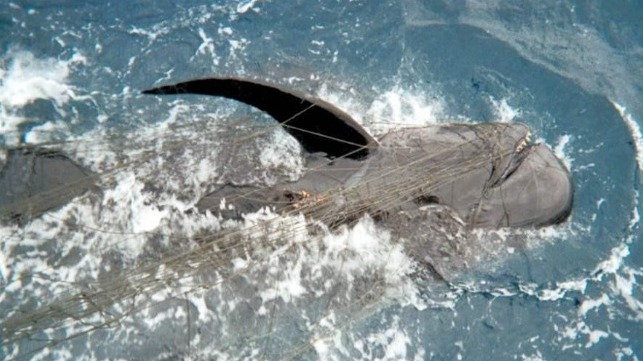After President Trump vetoed a bill to phase out the West Coast drift gillnet swordfish gear in federal waters, sponsor Sen. Diane Feinstein, D-Calif., promised to reintroduce the measure.
In his veto message Jan. 1, Trump said U.S. fishermen using the large mesh drift gillnets are already highly regulated. Banning the gear would result in more foreign-caught swordfish, landed under less rigorous environmental standards, into the U.S. market, he said.
The Driftnet Modernization and Bycatch Reduction Act, sponsored by Feinstein and Sen. Shelley Moore Capito, R-W.V., would set a five-year timetable for phasing out drift gillnets, and direct the National Marine Fisheries Service to assist fishermen in converting to new gear, such as deep-set buoy gear, with far less bycatch.
The lawmakers said drift gillnets that target swordfish and thresher sharks have unacceptable levels of bycatch, including federally protected marine mammals and sea turtles.
The bill would follow the lead of California, which in 2018 set a four-year schedule for phasing out the gear in state waters.
The gear is not allowed elsewhere in U.S. waters, and the limited-access fishery has been shrinking in recent years according to NMFS, from an estimated 150 participants in 1996 to 14 in 2020.
The gear typically consists of a 1,000-fathom net with stretched mesh size from 18 to 22 inches, with a 14-inch minimum size. “The net is set at dusk and allowed to drift during the night, with the fishing vessel typically attached at one end of the net,” according to a NMFS summary.
“The soak duration is typically 12-14 hours depending on length of the night.” The use of acoustic warning devices or pingers became a requirement in 1997 and significantly reduced entanglements with marine mammals, according to the agency.
Marine conservation and sportfishing groups have long pressed for elimination of the gear, and Feinstein said she would ring the proposal back on Capitol Hill immediately.
“There is not enough time to override the veto so I will reintroduce this bill on the first day of the new Congress and will push for quick enactment once President Biden is in office,” said Feinstein.







